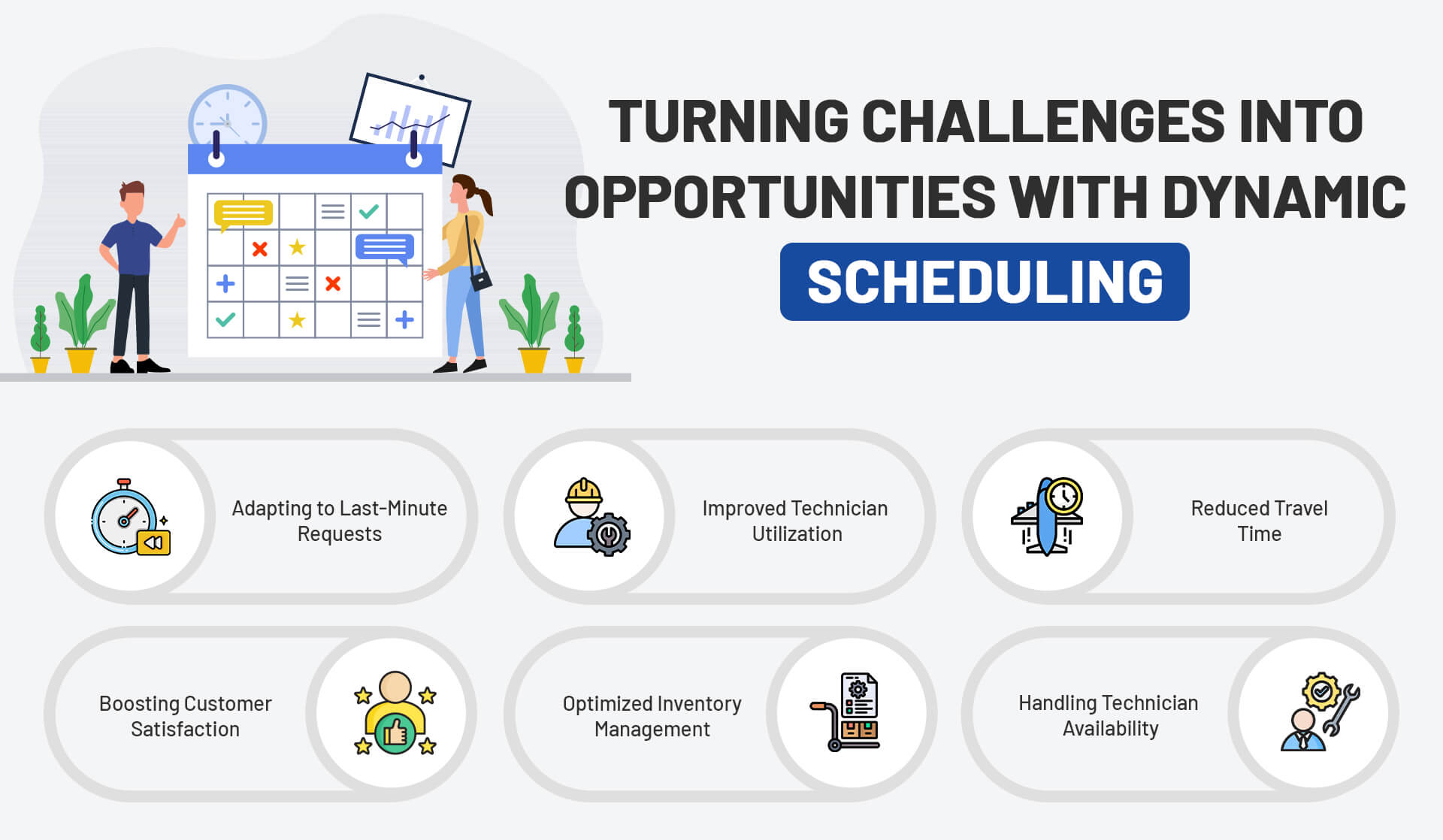Field service management (FSM) requires swift, precise decisions. Managing unexpected changes can feel overwhelming, but with the right tools, these disruptions become chances to thrive. Dynamic scheduling empowers businesses to tackle sudden changes, transforming challenges into opportunities. It helps solve persistent field service management challenges, allowing companies to excel in fast-moving environments.
In this guide, we will examine how dynamic scheduling can help you convert unforeseen disruptions into success. We’ll also explore key field service challenges and show how to overcome them effectively.
Key Challenges in Field Service Management
Field service management involves many moving parts. It requires coordinating field technicians, managing equipment, and providing services across various locations. One of the most pressing issues is how unpredictable service requests can be. Emergencies pop up with no warning, throwing off the planned schedule. These challenges can slow operations, frustrate customers, and exhaust technicians.
Unexpected Job Requests
Emergency repairs or urgent tasks interrupt the pre-planned schedule, forcing teams to adjust on the fly. Handling these surprise requests remains a core struggle in field service management. Without a flexible system, meeting customer needs while staying efficient becomes tough.
Limited Resources and Skills
Field service teams often deal with limited resources. Technicians spread out across locations may not have the right skills for every job. Matching the best technician with the right skills to the task creates logistical headaches.
Travel and Traffic Delays
Traffic jams and long travel times frequently cause problems in field service management. Technicians spend much of their day on the road, which affects their ability to reach customers quickly. External factors like traffic slowdowns or unexpected roadblocks add more chaos.
Customer Expectations and Satisfaction
Today’s customers expect fast, efficient service. They want quick response times, accurate arrival windows, and swift problem-solving. Balancing these expectations with the logistics of field service management requires constant juggling. Failing to meet customer standards damages service ratings and can hurt business.
Inventory and Equipment Management
Making sure field technicians have the necessary tools and parts for each job remains another major challenge. When technicians show up without the right equipment, it causes delays and frustrates customers. Efficient inventory management is crucial but hard to pull off without real-time updates.
Managing Technician Availability
Technicians may fall sick, or other unforeseen events can affect their availability. Keeping up with schedules, days off, and working hours requires constant monitoring. Failure to do this results in either overworking technicians or leaving customers waiting too long.
Turning Challenges into Opportunities with Dynamic Scheduling

Dynamic scheduling changes the game for field service management. It uses real-time data to optimize schedules continuously, allowing managers to respond swiftly to last-minute changes. This technology allows businesses not only to soften the impact of disruptions but to turn them into moments of improvement.
Adapting to Last-Minute Requests
Dynamic scheduling tools allow service teams to tackle emergency job requests with speed. Instead of manual adjustments, these systems automatically shift schedules based on priority, technician availability, and location. This flexibility trims downtime and ensures urgent requests are handled with ease.
Improved Technician Utilization
Dynamic scheduling tools efficiently match the best technician with the right task by considering skills, location, and availability. This method ensures that each technician gets tasks they are best suited for, boosting overall productivity. Moreover, it also cuts down on unnecessary travel, giving technicians more time to focus on their jobs.
Reduced Travel Time
By analyzing real-time traffic data, dynamic scheduling tools can map out the fastest routes for technicians. This minimizes time wasted in traffic and ensures technicians arrive on time. These systems can also quickly reroute technicians if unforeseen traffic slowdowns or roadblocks pop up.
Boosting Customer Satisfaction
Customers get real-time updates on technician arrival times. This clear communication manages expectations and boosts satisfaction. When customers know about potential delays or schedule changes, they are more understanding and cooperative.
Optimized Inventory Management
Dynamic scheduling tools connect with inventory management systems, ensuring technicians have the right tools and parts for each job. This reduces the chances of technicians having to return to the shop for equipment, saving time and resources.
Handling Technician Availability
Dynamic scheduling lets managers adjust for technician availability. If a technician calls in sick or runs late, the system quickly assigns the job to another available technician. This adaptability ensures service continues without major disruptions.
Embracing Technology for a More Efficient Field Service Operation
The modern field service industry leans heavily on technology. From mobile apps to IoT devices, businesses have many tools that can enhance their operations. Dynamic scheduling is one of those tools, transforming how companies tackle field service management challenges.
Real-Time Data Collection
Dynamic scheduling tools pull in data from sources like traffic updates, technician locations, and job statuses. As a result, this real-time information helps field service managers make smart decisions. When a new service request comes in, the system quickly reviews current schedules, finds the closest available technician, and assigns the task.
Mobile Tools for Field Technicians
Mobile apps play a major role in dynamic scheduling. Technicians get job updates, access customer details, and stay in contact with the back office in real-time. This fast communication boosts response times and reduces errors since technicians no longer rely on paper systems or manual entries.
Predictive Maintenance with IoT
The Internet of Things (IoT) has reshaped field service management. By leveraging connected devices, it monitors equipment performance in real time and predicts potential breakdowns before they happen. Additionally, dynamic scheduling systems pair with IoT sensors to plan preventive maintenance, lowering the chances of unexpected equipment failures and reducing downtime.
Automated Reporting and Insights
Dynamic scheduling systems create detailed reports on technician performance, customer satisfaction, and overall efficiency. These insights help field service managers identify weak spots and make data-driven decisions to improve operations.
Cloud-Based Solutions
Cloud-based dynamic scheduling tools offer flexibility and scalability. Furthermore, managers can access schedules and monitor operations from anywhere, making it easier to oversee large teams across multiple locations. Additionally, cloud-based solutions update automatically, ensuring businesses always have the latest features.
Related Article: Planning Well To Improve Efficiency
Overcoming Resistance to Change in Field Service Management
Despite the clear benefits, some businesses may resist switching to dynamic scheduling tools. Change is hard in any industry, but moving forward is key for companies that want to stay competitive. Here are some ways to ease the transition.
Start with a Pilot Program
Instead of switching the entire operation to dynamic scheduling at once, businesses can initially start with a small pilot program. This allows managers to test the system, gather feedback, and tweak processes before rolling it out. It also helps ease the concerns of technicians and staff who may hesitate to embrace new technology.
Offer Training and Support
Introducing new technology without training leads to frustration and pushback. Businesses should invest in training programs that show staff how to use dynamic scheduling tools effectively. Ongoing support also helps resolve technical issues or concerns as they arise.
Highlight the Benefits
Technicians may resist dynamic scheduling if they don’t see its advantages. By showing how the system reduces travel time, improves job assignments, and balances workloads, businesses can build enthusiasm for the new technology.
Involve Technicians in the Process
Field technicians are the ones who will use dynamic scheduling tools the most. Including them in the decision-making process and listening to their input helps create trust and ensures the system fits their needs.
The Future of Field Service Management
As technology evolves, so will field service management. Moreover, dynamic scheduling represents just one part of the bigger picture. In the future, we can expect even smarter systems that use artificial intelligence to predict service needs, automate more tasks, and elevate customer satisfaction.
The ability to turn last-minute changes into opportunities sets successful field service operations apart. Dynamic scheduling doesn’t just handle chaos—it creates a proactive, smart approach to field service challenges. By adopting this technology, businesses improve efficiency, boost customer satisfaction, and thrive in a competitive market.
Final Words
Dynamic scheduling reshapes how field service management deals with last-minute changes. It turns disruptions into opportunities, making operations smoother and customers happier. By embracing dynamic scheduling tools, businesses can transform their field service operations and move toward long-term success.
Related Article:Unlocking Customer Gains with Field Service Management Software









